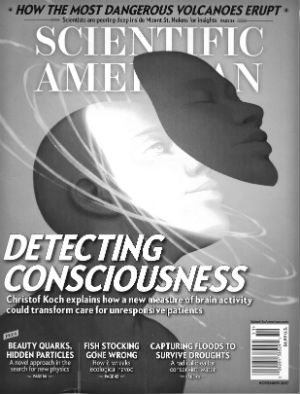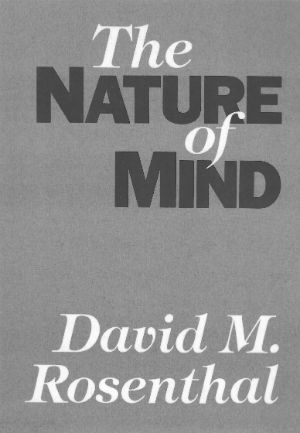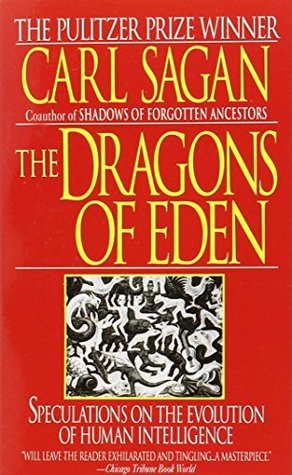Science, Scientism and the Consciousness Issue
By Ralph Di Fiore
 The source of human self-awareness and consciousness is much debated today.
The source of human self-awareness and consciousness is much debated today.(Ed. Note: The debate over the source of human mind and consciousness has taken a decidely materilaist, anti-spiritualistic spin recently. Ralph Difiore, principal of a respected college in Toronto, offers this hard-hitting introductory critique of the secular paradigm.)
Prominent atheists Richard Dawkins, Sam Harris and Lawrence Krauss to name only a few, have made it their life mission to attack and denigrate religion and religious belief. Though it has existed for centuries, scientism is alive and well in the 21st century. What you ask is scientism? A simple explanation is the following:
“Scientism can be defined as the triumphant claim of science even in contexts where there is insufficient empirical evidence to justify a scientific conclusion. It includes an excessive deference to the claims of scientists or an uncritical eagerness to accept any result described as scientific.”
One might add that scientism by its very nature is a militant assault on all things religious.
A foundational aspect of true science is the scientific method that every high school science student learned. A definition of the scientific method will help us refresh our memories of science classes long ago. For some it may have not been so long ago.
“The scientific method is a body of techniques for investigating phenomena, acquiring new knowledge, or correcting and integrating previous knowledge. To be termed scientific, a method of inquiry is commonly based on empirical or measurable evidence subject to specific principles of reasoning.”
Importance of Testing
The Oxford Dictionaries Online defines the scientific method as "a method or procedure that has characterized natural science since the 17th century, consisting in systematic observation, measurement, and experiment, and the formulation, testing, and modification of hypotheses". Experiments are a procedure designed to test hypotheses. Experiments are an important tool of the scientific method.”
Having established what scientism and the scientific method are, we shall now proceed.
 Author Difiore offers a spirited defence of the traditional soul/body paradigm.
Author Difiore offers a spirited defence of the traditional soul/body paradigm.The Consciousness Paradigm
Let us begin with a major bastion of scientism, the basis for our consciousness and the lack of free will that results from scientism’s explanation of what consciousness is.
What atheists and religious believers both share is the understanding that as humans we possess consciousness. This is not in dispute. You and I are aware of our existence and we are conscious of it. One can easily say that it is the one reality that we can know for sure exists. It is the primary feature of our existence.
It is a rather curious fact from the onset that as humans almost all of us have taken our consciousness for granted. We are born conscious and proceed in our lives as conscious beings. At some point we may believe that our consciousness is being generated by a soul or some other method of immaterial means. It is here that the proponents of scientism enter the picture. How does one explain our conscious existence?
The Brain alone?
Again, both militant atheists and religious believers accept that consciousness is associated with the human brain. For the atheists however, it is the brain itself that is generating our consciousness in some, yet to be determined fashion. Consciousness is considered a mere by-product of brain activity. There is no immaterial soul nor an immaterial process that is responsible for our consciousness and awareness. Gilbert Ryle ridiculed the idea of a soul in his famous phrase, the ghost in the machine.
The "ghost in the machine" is British philosopher Gilbert Ryle's description of René Descartes' mind-body dualism and the name of a book with the same title by Arthur Koestler. The phrase was introduced in Ryle's book The Concept of Mind (1949) to highlight the absurdity of dualist systems like Descartes' where mental activity carries on in parallel to physical action.
 The relation of Mind to Body has become a philosophical as well as a neurological issue.
The relation of Mind to Body has become a philosophical as well as a neurological issue.
Epi-phenom-en-WHAT?
So the question then becomes, what is animating us? What is producing our consciousness? Scientism has an answer and it is found in what is known as epiphenomenalism. A definition is in order once again.
“Epiphenomenalism is a mind–body philosophy marked by the belief that basic physical events (sense organs, neural impulses, and muscle contractions) are causal with respect to mental events (thought, consciousness, and cognition). Mental events are viewed as completely dependent on physical functions and, as such, have no independent existence or causal efficacy; it is a mere appearance.”
In simpler terms, the belief of epiphenomenalism is that consciousness is a mere appearance caused by the physical functions of the brain. It is a secondary by-product of physical activity in the brain. There is no mind, you see, only a physical brain that is somehow throwing off consciousness and giving us the appearance of mind.
First, it must be noted that it follows how scientism comes to this conclusion. If there is no immaterial soul or immaterial substance responsible for our consciousness and awareness, it must somehow be generated by the physical organ of the brain itself in some yet to be explained manner. Yet, going back to the scientific method, you have not proven your hypothesis. You have consciousness associated with a brain but no rigorous scientific proof that the atoms that make up the brain are somehow producing consciousness.
Cement-heads?
To complicate matters, the atoms that make up the brain are no different than the atoms that make up inanimate objects like a block of cement. In fact, if it were possible to extract the atoms from the block of cement and exchange them with the brain’s atoms, you would still have consciousness present in the brain though the block of cement, now filled with the brain’s atoms would in no way be conscious. This might give some credence to the lack of conscious activity associated with individuals referred to as “block heads”. (One has to find humour in such matters.)
So it is evident that science has in no way shown how consciousness is generated. Scientism merely derides and denigrates the idea of a soul and seems to miss the irony in its own position. To believe in the ability of ordinary atoms to produce consciousness is not dissimilar to something immaterial being responsible for our conscious awareness.
The By-product Theory
It is argued by scientism, to prove their point that the atoms of the brain are generating consciousness, that any damage to the brain hinders conscious activity. Therefore, consciousness is indeed a by-product of brain activity because to damage the brain is to damage consciousness.
Why if we had a soul, it would not be damaged by a damaged brain they claim.
Has it ever occurred to them that they are in fact thinking along the lines of a person who feels that a radio is generating its sounds as a result of the physical components that make it up? No sane person, however ignorant of radio waves, would think that the radio was doing anything else but merely receiving the radio signals that were being transmitted to it. One would question the sanity of someone who insisted that the atoms that make up the components of the radio were producing the sound being emitted from the radio. Or that the physical components of a television are producing the images on the screen.
It also follows, as a corollary, that damaging the components of a radio or television would affect their ability to function properly. In the same vein, all the arguments that propose that damaging the brain affects consciousness hold true if the brain is merely a receiver and not a generator of consciousness. Neurosurgeons are in effect cognitive tv and radio repairmen and repairwomen. They fix the components of the brain to allow it to receive consciousness just as the tv repairman of yesteryear repaired our television sets. A damaged brain produces a damaged conscious signal just as a damaged television produces a distorted image on the screen.
The Free Will Argument
Along with consciousness being a mere by-product of brain activity comes the notion held by many who promote scientism, that since there is no immaterial mind, only the physical brain, causality, that is everything that happens has a prior cause in the physical realm, precludes our ability to have free will.
Scientism holds to the view that mind is illusory, caused by physical processes and since physical processes all have prior causes, free will is impossible. According to scientism, we live in a deterministic universe. One physical event causes another ad infinitum. We are in effect mindless automatons. They don’t mean mindless in a metaphorical sense, they mean it in a literal sense. Our brain does what it wants and we go along for the ride, fooled into thinking we are actually deciding our actions. There is no immaterial mind, just a brain somehow magically throwing off consciousness. Perhaps there should be a phrase the “ghost in the atom” to explain how the brain’s ordinary atoms are producing consciousness.
It would be a logical extension of their belief system if they maintained it but they don’t.
Scientism (then) turns around and denigrates and mocks religious belief as silly and nonsensical thinking.
Have they forgotten that in their view, with the absence of free will, any belief, religious or otherwise is not freely chosen but part of a deterministic universe that does not allow us choice. They can’t have it both ways. If they truly believed their position, the only logical conclusion they could come to would be that religious thinking is not chosen freely, that since we are all automatons, some automatons are religious and others are not. Why attack religious belief in an automaton? Automatons have no choice in their decisions so to attack them and denigrate them is ludicrous.
But it gets better! As they believe that we are mere automatons and not freely choosing our actions, then would it not follow that they themselves could become religious? No they would argue, they would not fall into such silly thinking, being the rationalists that they are.
The Contradiction at the Heart
But have they forgotten that there is no free will? If their brains causally made them religious, they would be in no position to resist. Automatons cannot defy their programming. To resist implies free will and suddenly we see how little credence they give their position. You can’t have your cake and eat it. You can’t believe in determinism and at the same time, attack religious belief. They are contradictory positions. Anyone truly holding to a belief of determinism would be afraid to get up in the morning. What horrors await you when your brain decides to do want it wants and you have no ability to stop it.
I have not yet dealt with artificial intelligence.
 Carl Sagan championed the concept of Artifical Intelligence a generation ago.
Carl Sagan championed the concept of Artifical Intelligence a generation ago.The World of Artificial Intelligence: A Review
There are various levels of artificial intelligence but the one that is touted as equaling a human mind is strong AI. Strong AI is going to be superior to human consciousness. Self awareness accompanies human consciousness and is a primary feature of it. Strong AI will be aware of itself just as humans are aware of themselves, the proponents of strong AI maintain.
How are they proposing to do this? In an algorithmic manner. Programmed algorithms will be capable of self programming, this self programming will then give rise to self awareness and presto you have sapient artificial intelligence. The likes of Bill Gates, Ray Kurzweil and Elon Musk hold forth that this is indeed what will happen.
There are two major problems with their thinking. First, as you can gather from the previous explanations that scientism holds to the view that there is no free will, are these strong AI creations going to have what we humans do not according to scientism? Are they going to have free will? If we live in a deterministic universe, algorithmically programmed robots would be subject to causality and not capable of free willed decisions just as we humans are not capable of free will in the deterministic worldview.
Godel’s Incompleteness Theory
An even greater insurmountable hurdle that they have yet to fathom lies in the great logician Kurt Godel’s incompleteness theorems. In short, Kurt Godel stunned the mathematical world in 1931 when he showed that mathematics cannot be captured in a formal axiomatic system. The goal of prominent mathematicians like David Hilbert had been to formalize, that is to find axioms that would encapsulate all mathematics. Bertrand Russell and Alfred North Whitehead worked for a decade on this very concept and produced the massive work known as Principia Mathematica. All of this was dashed in a stunning intellectual set of theorems by the brilliant logician Kurt Godel. The implications and consequences are astounding.
The human mind is either creating mathematics or accessing it. It depends on whether you are a Platonist who feels that mathematics exists independent of humans and that we are merely discovers of it or if you feel mathematics is an invention of the human mind. In either case, since mathematics itself cannot be captured in any logarithmic/axiomatic fashion, the human mind which either accesses mathematics or creates it, by logical extension cannot be captured by a formal axiomatic/logarithmic system. Strong AI hopes of duplicating the human mind via a formal axiomatic/logarithmic system is pure fantasy. They are performing a logarithmic “hail Mary pass” and hoping the end result is sapience.
I hope it is clear now that the ordinary atoms of the brain are not generating consciousness and that our minds are not mere algorithmic processes. Scientism’s claim that ordinary atoms are generating consciousness without being able to explain how is simply not following the scientific method that is the hallmark of science. Imagine doing an experiment in which the result that occurs is explained in a manner that can’t be proved. This is the position scientism is in when it claims that consciousness is a mere by-product of physical processes in the brain.
Enter the Soul
So where does that leave us? The major faiths of the world believe that humans are animated by souls. Scientism attacked this in its infancy, drunk on its own power of explanation of the natural world but as we can see, they have no explanation as to what animates us. The presence of a soul even makes sense in the context of famous brain experiments done by Libet that purport to negate free will. Here it was shown through sophisticated equipment that the conscious mind became aware of a decision only after it had been made. Something makes the decision prior to conscious awareness of it. The conscious mind merely thought it was making a decision when in fact that decision had already been made. Hence no free will. Back to that problem again.
No, not at all. The presence of a soul is the actual logical conclusion of the Libet experiment. The soul makes the decision and presents it to the brain. It would be logical to have a very small fraction of time lapse in the transmission of the decision. Since the brain is a receiver and not a generator, this makes perfect sense.
You can now rest assured that your belief in a soul has a solid foundation. This is the implicit message of a book I recently had published and which is available on Amazon. I put all of the points of this article in the humorous setting of a kindergarten class. It is entitled AI and Free Will on the First Day of Kindergarten and is available on Amazon.